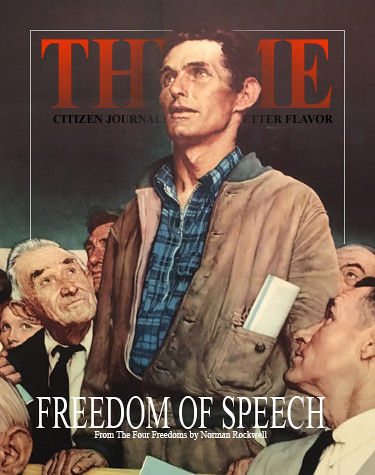
Freedom of Speech by Norman Rockwell
Norman Rockwell's America
An exhibit entitled Norman Rockwell’s America is currently touring the country. We saw it in Winchester, Virginia. The show features some of the artist’s actual canvasses and many Saturday Evening Post Covers. In our age it was striking that Rockwell had a clear vision of our country. Here is his painting of “Freedom of Speech.” Rockwell captured the noble spirit of everyday Americans. Looking at the covers, one is impressed that America knew who she was in many ways – and she knew who her enemies were. Communism gets a pretty straight rebuke. Rockwell would go on to address the wrinkles as well, tackling issues such as segregation. The body of work is as great a picture of America as will ever exist. Moreover, the show gives us examples of Rockwell’s true mastery of his art – learning from the great masters.
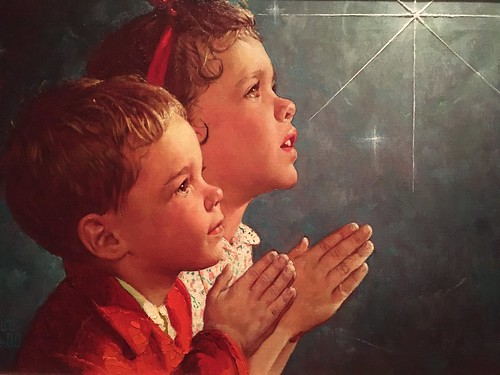
In an era when America embraced her founding values, Rockwell painted Two Children Praying (1954) as a billboard advertisement for Longchamp's Restaurant in Union Square, New York.

In the painting The Young Valedictorian (1922) Rockwell captures lighting and color reminiscent of artists such as Degas and Rembrandt.

The Party after the Party (1922) was comissioned by General Electric (Edison Mazda) for a light bulb advertisment.
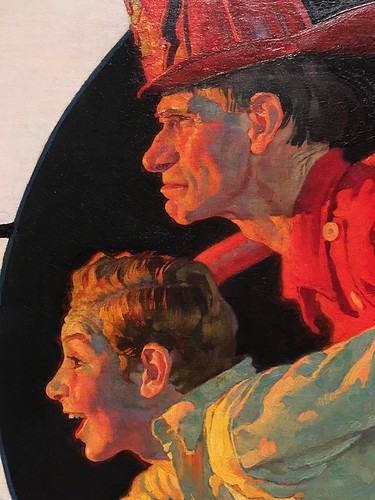
Volunteer Fireman. (1931)
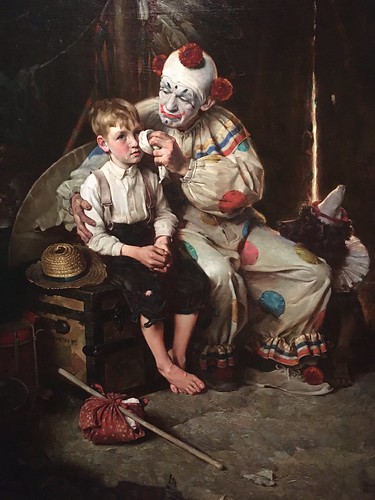
The Runaway. (1922)
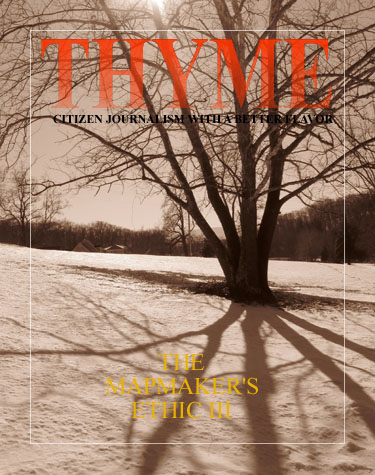
Acurracy Matters
The Mapmaker's Ethic III
Reliable Directions for an Important Journey
Maps are an important tool for navigating what is often to the user unknown regions. The users' success and ultimately their safety in the journey requires that the mapmaker strive to provide the most accurate depiction his or her art can produce of the ways of travel, their conditions, and possible dangers!
For the LORD is good; his mercy is everlasting; and his truth endureth to all generations." -- Psalm 100:5
Mapmakers strive for accuracy. Truth in the depiction of many details is essential to their work being trustworthy and safe. A wonderful old road atlas I acquired in my boyhood even went so far as to suggest a traveler make local inquiry before venturing onto some of the more obscure unpaved roads shown. After Hurricane Katrina I traveled to Waveland, Mississippi. The map said that U.S. 90 crossed Bay St. Louis on a bridge. We drove to the barricade at the end of route 90. The bridge had been washed away.
Many scholars, who would INSIST on accurate maps to guide them on the highway, scoff at the notion of "Absolute Truth" in the spiritual realm. They would NEVER seek to drive to Chicago subscribing to the notion that all roads are equally valid. Yet, when it comes to matters eternal, they reject the notion that there might indeed be specific direction available to them. Most likely they would find in Holy Writ some example of "Absolute Truth" similar to the now missing U.S. 90 bridge , and dismiss the veracity of ANY claim to "Absolute Truth." But they would be missing the mark.
No trucker, upon discovering the missing route 90 bridge, would throw his atlas out the window. Instead, he would probably take note that the atlas itself states that while every effort has been made to verify the information contained in the publication, errors or omissions are possible and contact information is provided for those observing such discrepancies to report them. The map, you see, is a hard record of an Earthscape that is changing. These changes are caused both by natural forces and the actions of mankind.
Yet the difficulty of documenting it in no way discredits the truth that an absolute set of conditions exists. Historical maps document well the succession of changes and if one will study maps, it may be argued, they will make wiser decisions as they travel. The very fact that maps are made argues that there is indeed a truth to be recorded. So it is, I would argue, with human history as well. If the Divine has indeed revealed eternal truths to mankind, and scribes have striven to record them accurately, as Jews and Christians have taught for centuries, then there must needs be maps for the world unseen as well.
Dismissing the validity of scripture because you find a prohibition on eating shellfish is similar to discrediting the use of maps because you fail to place it in context. A 1947 map of the United States will lack Interstate Highways, yet it would have shown you how to cross the country on the Mother Road, Route 66! That same route has been renamed I 40 in our times and is wider. Similarly Leviticus mapped a path for G-d's people in a time when eating shellfish was dangerous. In Leviticus 14, detailed procedures are given for dealing with mold in structures. I was tempted to conider such information 'archaic' until I attended a conference of the National Institute of Restoration.
It was there that I met a man who was severely disabled. He had been performing mold mitigation on a building and the work required him to go into many small spaces and resulted in exttended exposure to the mold. There are indeed different strains of mold (Leviticus describes this), and the kind this man encountered was the more dangerous kind. His heart had been severely damaged from his prolonged exposure to it. After meeting him I took the matter of mold in my own house, or that of a friend, very seriously. Scriptural guidelines on diet and hygene are actually quite helpful upon untering an unfamiliar culture.
The fact that Holy Writ comes in a series of books, all building upon previous revelation, might be analogous to the process of refining maps. Stop and think about it. There is so much information contained in historical maps that is still useful today. Moses shows you the beginnings of G-d's interactions with mankind. In Genesis we see the concept of IMAGO DEI, that mankind uniquely bears the image of his maker. Abraham is charged that through him: "All nations of the Earth shall be blessed." Redemption is seen in the calling out of an enslaved people to become a nation for that purpose.
History affirms the work of G-d in establishing a people, and yet read further. Isaiah 60 describes a road unseen that we have yet to travel. Just as Moses brought a promise that was fulfilled, the prophets bring more promise.
Can We Trust Our Maps?
As I was researching this article, I came across a very interesting article about Cartography as Wayfinding for the Soul [click to read]. Some may encounter such an article and scoff: "See, there is much that may be placed subjectively into maps." But consider this, just as my map of Middle Earth, created in my youth, described no actual country; but accurately represented the creation of J. R. R. Tolkien's fertile imagination. Even 'educational' maps may organize very real information in a subjective manner. Creating maps of Ice-Age Europe for CIVITAS, Kristina Elaine Greer and I placed icons of animals on them to describe the fauna of the time. Here the convention of icons might be seen to create an 'untruth,' for there are no Great Auks the size of New Jersey actually lying upon the landscape.
But is it an untruth? No. It is a convention that is understood across many cultures. Thus it may be useful to remember that Divine Revelation was handed to scribes who also inhabit their own set of cultural conventions in the use of language. Sometimes an honest exploration of idioms is necessary. I defy you to understand more recent writings, such as those of Shakespeare, without doing so.
Scripture 'scholars' at our great universities also are fond of "multiple authorship theories," that supposedly discredit Holy Writ. My own work as an artist suggested, however, a more plausible explanation. Looking back at my early attempts, I find they are often very different from my more 'mature' works. A mentor once scolded me for inconsistency. Writers as well will develop as they go along. Realizing that the writers of Holy Writ often began with no concept of the greater work intended by G-d, it is greater evidence for firsthand writing that it has not been 'smoothed.'
In fact, there is an 'Embarassement Factor' present in these works, for there is little or no attempt to smooth over those things that appear in Holy Writ that present a less than flattering picture of Kings, Prophets, Apostles and Patriarchs. You might want to remember this when randomly choosing passages to read to young children!
Importance of Investigation
Granted, there are scholars of the Bible who have taken it apart in their writings and present the conclusion that it is not truth. I would only ask them to go back and honestly check their work. The vast majority of those who resist the notion that faith is important have done little or no exploration on their own. Some honest seekers have indeed found themselves mired by the inexplicable problems of pain and evil. To them I would offer a piece of advice from a wise family member... that someone, somewhere in the household of faith has wrestled with these issues before you. Seek out their counsel.
G-d and Suffering
Isn't human suffering proof that a just, all-powerful G-d must not exist? On the contrary, says Boston College Professor of Philosophy Peter Kreeft. How can "suffering" exist without an objective standard against which to judge it? Absent a standard, there is no justice. If there is no justice, there is no injustice. And if there is no injustice, there is no suffering. On the other hand, if justice exists, G-d exists.An objective standard is indeed a solid mark on a map!
Boston College Professor of Philosophy Peter Kreeft.
The Mapmaker's Ethic Restated:
Study to shew thyself approved unto God, a workman that needeth not to be ashamed, rightly dividing the word of truth." -- 2 Timothy 2:15
Paul the Apostle wrote these words to Timothy, his young apprentice in the Gospel ministry. I am priviledged to know a young man of our age who is not afraid to walk that same path. The young Minister stirs the soul as he clearly presents the Gospel from the classic texts on Faith. He is quick to reference good maps in doing so! Oh, the richness of Martin Luther's Preface to Romans!
This letter is truly the most important piece in the New Testament. It is purest Gospel. It is well worth a Christian's while not only to memorize it word for word but also to occupy himself with it daily, as though it were the daily bread of the soul. It is impossible to read or to meditate on this letter too much or too well. The more one deals with it, the more precious it becomes and the better it tastes. Therefore I want to carry out my service and, with this preface, provide an introduction to the letter, insofar as God gives me the ability, so that every one can gain the fullest possible understanding of it. Up to now it has been darkened by glosses [explanatory notes and comments which accompany a text] and by many a useless comment, but it is in itself a bright light, almost bright enough to illumine the entire Scripture.
To begin with, we have to become familiar with the vocabulary of the letter and know what St. Paul means by the words law, sin, grace, faith, justice, flesh, spirit, etc. Otherwise there is no use in reading it." [1.]
The young Minister is concerned today with the matter of Faith. Though Faith is often mentioned, few unroll the great charts to plot its implications. The young Minister has no fear in doing so. He references Luther's thoughts on this great Truth:
Faith is not that human illusion and dream that some people think it is. When they hear and talk a lot about faith and yet see that no moral improvement and no good works result from it, they fall into error and say, "Faith is not enough. You must do works if you want to be virtuous and get to heaven." The result is that, when they hear the Gospel, they stumble and make for themselves with their own powers a concept in their hearts which says, "I believe." This concept they hold to be true faith. But since it is a human fabrication and thought and not an experience of the heart, it accomplishes nothing, and there follows no improvement.
Faith is a work of God in us, which changes us and brings us to birth anew from God (cf. John 1). It kills the old Adam, makes us completely different people in heart, mind, senses, and all our powers, and brings the Holy Spirit with it. What a living, creative, active powerful thing is faith! It is impossible that faith ever stop doing good. Faith doesn't ask whether good works are to be done, but, before it is asked, it has done them. It is always active. Whoever doesn't do such works is without faith; he gropes and searches about him for faith and good works but doesn't know what faith or good works are. Even so, he chatters on with a great many words about faith and good works.
Faith is a living, unshakeable confidence in God's grace; it is so certain, that someone would die a thousand times for it. This kind of trust in and knowledge of God's grace makes a person joyful, confident, and happy with regard to God and all creatures. This is what the Holy Spirit does by faith. Through faith, a person will do good to everyone without coercion, willingly and happily; he will serve everyone, suffer everything for the love and praise of God, who has shown him such grace. It is as impossible to separate works from faith as burning and shining from fire. Therefore be on guard against your own false ideas and against the chatterers who think they are clever enough to make judgements about faith and good works but who are in reality the biggest fools. Ask God to work faith in you; otherwise you will remain eternally without faith, no matter what you try to do or fabricate." [2.]
On High School Reunions
By Bob Kirchman
Oh wow! The invitation was a reminder of how the years have passed! As you read this my 50th high school reunion will have come – and passed. Yes it is a milestone. A lot of people would say “You should go.” But I shall pass. First of all, let me explain that being as I left home and now live out of state, the cost is a bit much. When I got the lovely invitation I did some simple math:
Ticket to the dinner at a country club and open bar: $125.00
Guest: ..............................................................................60.00
“Suggested” donation to the alumni fund: ....................100.00
Admission to the football game: ......................................Free!
Hotel room (Holiday Inn Express): ...............................211.00
Travel: ...........................................................................300.00+
Okay, we’re coming up on eight hundred dollars to relive one of the most awkward times in my life. I was the nerdy kid who did art, built little scale models in the basement and generally had no social life outside of church and life in our little town. I got picked on a lot. I learned to be patient with the societal pecking order and once in a while I would get in detention for punching back (funny how teachers seem to always nail retaliation). I did have a few good mates (mostly on yearbook staff). I did run cross country, but athletics was not my focus. I spent a lot of time in the woods. That led me to seek God. He was seeking me. The quiet helped me see that.
At this point it would be well for me to state that while I am a bit of an introvert, I am by no means antisocial. Yesterday we had a beautiful dinner with a pastor friend of mine who’s moving on to take a pastorate in Maryland. He, his wife and four (soon to be five) beautiful children enjoyed hanging out at the house and he told me of the move and mission before him. I met him at an overlook on the Blue Ridge Parkway. I was in a sullen mood that day but his little daughter, in his arms, waved at me with the sweetest expression. I had to say hello.
It turns out he is a refugee from the terrible genocide in Rhwanda. He married an American girl from New Jersey and they eventually settled in Virginia. We became good friends – more we became family as I helped him with his youth ministry. For some reason Africans don’t think old guys are irrelevant in youth work. My point is that I do live surrounded by people who stretch me. I have taught art classes for homeschoolers. They are actually popular with the kids. I like people. I’m not as much of a recluse as you might think. But back to the reunion:
If I lived in town I’d probably go – at least to the game! I love a good high school game with all its pageantry. But do I really want to spend the cash and time to catch up with people I simply haven’t kept up with for five decades? Statistics say that 30% or less of your class actually will go to these things. I somehow sensed that this could be like those fancy dinners homebuilder’s associations put on monthly. You join and go to them for ‘networking.’ You meet a few good people who become great clients and friends, but mostly you end up at a table surrounded by cell phone salesmen.
There are a few guys I might really enjoy catching up with, but over the years I’ve found that you maintain direct contact with a few people you really enjoy and the rest you simply don’t. Again, high school is an experience a lot of us are happy to have put behind us. Rush Limbaugh once said “Go to your high school reunion. Seek out the popular kid who ‘had it all together.’ Get in a conversation with him or her and drop the remark: “You know, that was a really hard time for me.”” Rush says that they will inevitably say “Yeah, it was for me too.” Quite a revelation: Youth is difficult for all of us. Even the cool kids struggle.
And Rush, I’ll just have to take your word for it.
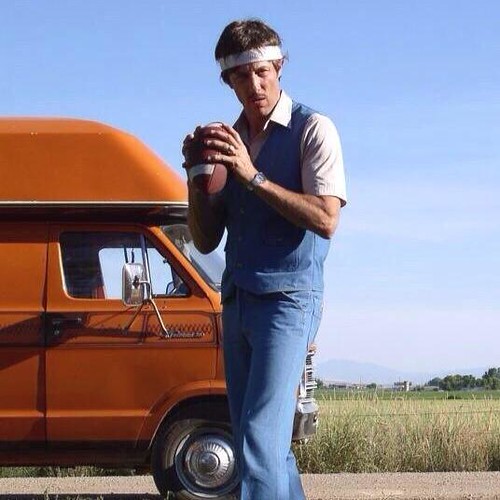
Uncle Rico remembers his glory days throwing the football in the movie Napoleon Dynamite.
Another Perspective
[click to read]
Elizabeth Dunkel has Quite a Different Perspective (read more)

Bridge, Paint Bank, Virginia. Photo by Bob Kirchman

Falling Spring Falls. Photo by Bob Kirchman

Falling Spring Falls. Photo by Bob Kirchman
On Driving SARS-CoV2 Extinct
[click to read]
By Heather Heying and Bret Weinstein
Why We Need a Multi-Pronged Approach
We are at a crossroads. There is a deadly virus circulating and out of control. Many have died, and many more certainly will. We can choose to use all available tools to eradicate this virus, or we can allow it to become a permanent fellow traveler, endemic to humanity. The first option has a high cost, but that cost is finite, largely ending when the disease ends. The second option is much worse. To the cost that we have already paid, add a continuing pattern of suffering and casualties going forward indefinitely. This toll is incalculable. Some have argued that it is already too late—an evolutionary hazard we warned about early in the pandemic—but we have yet to see a compelling argument to support this belief, and until such a case is made we, together, are morally obligated to pursue the eradication of Covid-19. (read more)
The Most Dangerous Plague of All
[click to read]
Just a year ago, Dr. Anthony Fauci was widely regarded as a wise, warm, grandfatherly medical expert whom Americans could trust to guide them safely through a frightening pandemic. Today, we know that besides ushering in the catastrophic long-term national lockdown based on absurdly flawed computer modeling, changing his positions on almost everything, and increasingly flat-out lying, Fauci ignored the U.S. government’s own ban on funding dangerous “gain of function” research and recklessly sent American taxpayers’ hard-earned money to the Wuhan Institute of Virology to fund Frankenstein-type experiments to make bat coronaviruses more dangerous to humans. That is literally true. As U.S. Sen. Rand Paul, a medical doctor himself, recently concluded: “Fauci could be culpable for the entire pandemic.” (read more)